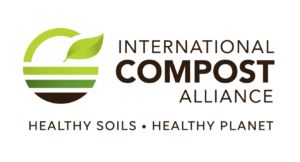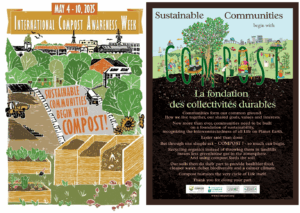
FOR IMMEDIATE RELEASE
Contact: Dr. Stefanie Siebert, siebert@compostnetwork.info, European Compost Network ECN e.V.
Sustainable Communities Begin with Compost!
From tackling climate change to increasing food security,
water quality and strengthening biodiversity,
one simple, thoughtful act delivers big, positive impacts – COMPOST!
May 4–10, 2025 marks this year’s International Compost Awareness Week (ICAW) — a global celebration of compost and its power to build stronger, healthier, and more sustainable communities.
“Composting organic residuals and creating compost is proven to tackle climate change, while also helping grow nutrient-dense food and support healthy soils,” said Dr. Stefanie Siebert at European Compost Network e.V.. Add to this, it can also bring communities together, support local food systems and help achieve sustainability goals.
This year’s theme, “Sustainable Communities Begin with Compost!”, drives home a powerful truth that every banana peel, coffee ground and lawn clipping we compost instead of throwing them away delivers great environmental gains by:
- Reducing Methane Emissions: Organic waste in landfills generates methane, a greenhouse gas with 86 times the global warming potential of CO₂ over 20 years. Diverting organic waste to composting or anaerobic digestion can drastically cut these emissions.
- Keeping nutrients in circulation: There are many valuable nutrients in organic residuals which can be returned to our soils for further productive use through compost. These nutrients are not returned to soil if incinerated.
- Increasing Soil Health: Compost produced from the recycling of organics residuals improves soil structure, enriches soil with nutrients, enhances water retention, minimizes soil erosion and strengthens biodiversity.
- Fighting Climate Change: Compost’s return to the soil serves as a “carbon bank”, helping to store carbon thereby removing it from the atmosphere and mitigating climate change.
Globally, composting is the heart of the circular economy. This positive action addresses the largest share of waste generated by Society as a whole, helping to:
- Recycle over 85 million tonnes of biowaste every year.
- Reduce greenhouse gas emissions by more than 9 million tonnes of carbon dioxide equivalents a year through storing carbon in soil and offsetting fertilizer use (an equivalent to
driving an average petrol/gas-powered car for 36 billion kilometers (23 billion miles); almost 95 thousand times the distance between the earth and the moon!). - Naturally recycling over 1 million tonnes of plant macro nutrients, supporting improved productivity and farm profitability.
And yet, while all this good is well known, landfilling and incineration continue as the main ways to manage unavoidable organic residuals, wasting enormous potential to address global and local sustainability goals and stop climate change.
"Compost is more than waste management—it's community transformation," remarked Dr. Stefanie Siebert at European Compost Network e.V.. "When we compost, we invest in more than soil—we invest in cleaner air, stronger communities, and a healthier planet for future generations. This impactful practice only takes us a few minutes each day. Through International Compost Awareness Week, compost advocates around the world are united in highlighting the immense potential of composting and compost for building sustainable communities."
For more information about International Compost Awareness Week and how to get involved, visit:
https://www.compostnetwork.info/policy/biowaste-in-europe/international-compost-awareness-week/
10 reasons to love Compost!
- It turns trash into treasure.
Food scraps and yard waste become rich, life-giving soil. It’s the ultimate upcycle!
Over 30% of what we toss could be composted. Composting lightens the load on our landfills—and our planet. - It reduces greenhouse gases.
Composting prevents organic waste from rotting in landfills, where it produces methane—a super potent greenhouse gas. - It feeds the soil, not the landfill.
Composting produces compost, the single most important ingredient for healthy and productive soil. Compost contains lots of slowly released plant nutrients. - Improve soil structure
Healthy compost not only adds nutrients, but it also improves soil structure, reducing erosion and bringing life back to tired soils. - It supports local food systems.
Compost helps grow more resilient crops and more nutrient-rich fruits and vegetables—right in our communities. - It’s free and easy to start.
Whether you live in an apartment or on a farm, there's a composting method for you (hello, worm bins!). There are many ways you can turn your leftover organics into a valuable soil amendment without spending a dime. - It saves water.
Compost improves soil’s ability to retain moisture, which means less watering and more drought resistance. - It increases resilience.
Compost makes communities more resilient to extreme weather conditions by increasing soil infiltration and being the key component in green infrastructure media mixes. - It builds community.
From school gardens to neighbourhood compost hubs, composting brings people together for a common cause. - It’s the future of sustainable living.
If we’re serious about fighting climate change and protecting ecosystems, composting has to be part of the solution.
Bonus Reason? It just feels good to know you’re making a positive difference—one banana peel at a time. ♻️
Happy International Compost Awareness Week!

-ENDS-
Notes to Editors
The International Compost Alliance is comprised of:
The Association for Renewable Energy and Clean Technology (REA);
The Australian Organics Recycling Association (AORA);
Compost Council of Canada (CCC);
European Compost Network (ECN);
International Solid Waste Association (ISWA);
Italian Composting and Biogas Association (CIC);
CRÉ - Composting and Anaerobic Digestion Association of Ireland;
The Organics Recycling Association of South Africa (ORASA);
WasteMINZ (Waste Management Institute of New Zealand);
